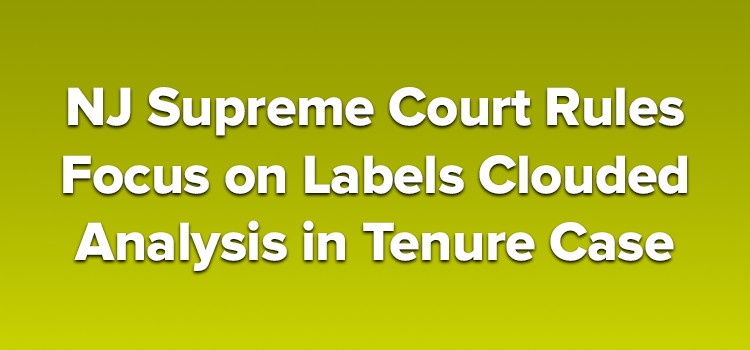In Melnyk v. Board of Education of the Delsea Regional High School District (A-77-18/082354) (Decided January 30, 2020), the Supreme Court of New Jersey held that an instructional and tenure-eligible position did not become extracurricular and tenure ineligible simply because the teacher already held tenure in another position. According to the court, the tribunals that concluded the teacher suffered no deprivation of her tenure rights engaged in legal error by labeling the position as “extracurricular” and then short-circuiting the requisite analysis based on that classification.

Facts of Melnyk v. Board of Education of the Delsea Regional High School District
Paula Melnyk alleged that her tenure rights were violated when she was not continued in her after-hours teaching position in a tenure-eligible alternative education program and was replaced by a non-tenured teacher. Melnyk was a tenured special education teacher with considerable seniority within the school district when this dispute arose.
Melnyk was a full-time special education teacher employed by the Board of Education of the Delsea Regional High School District (the Board) since September 1991. In that capacity, she was required to hold an Instructional Certificate that included endorsements as a “Teacher of the Handicapped and Elementary School Teacher” and as having “highly qualified status in English instruction.” In September 2002, the Board first assigned Melnyk to work as a “Special Education Alternative Program Teacher” to teach special education classes in the evening in addition to her regular daytime instructional position. The “BookBinders” program was provided for children who were not succeeding in the general education program or were mandated for removal from general education. To hold her BookBinders teaching position, Melnyk was required to have an Instructional Certificate with a Teacher of the Handicapped endorsement, which is the same certificate and endorsement required of her for her day position as a special education teacher.
Melnyk served as a special education English teacher in the BookBinders program from 2002 through the end of the 2014-15 school year, with the exception of the 2009-10 school year. In August 2014, the Superintendent of Schools for the Board informed Melnyk that it was assigning another, non-tenured teacher to teach English in the BookBinders program in the following 2015-16 school year. Melnyk promptly filed a petition of appeal with the Commissioner of Education to challenge that decision as a violation of her tenure rights. An administrative law judge (ALJ) determined that Melnyk’s assignment with BookBinders was extracurricular and concluded that Melnyk was not entitled to tenure in that position because the extracurricular position did not require additional certification beyond what Melnyk already possessed. In a Final Agency Decision, the Commissioner of Education adopted the recommended findings and conclusions of the ALJ’s Initial Decision. The Appellate Division affirmed, citing to a line of administrative determinations holding that teachers may not acquire tenure in an extracurricular position unless additional certification is necessary to hold the position.
New Jersey Supreme Court’s Decision
The New Jersey Supreme Court reversed. “We hold that petitioner met the statutory criteria for tenure and that she is entitled to a remedy for the violation of her right not to be removed or reduced in salary while protected by tenure for her work in the BookBinders program,” Justice Jaynee LaVecchia wrote on behalf of the court.
In reaching its decision, the court emphasized that the use of labels had clouded the tribunals’ analysis regarding Melnyk’s tenure. It further noted that in accordance with Spiewak v. Summit Board of Education, 90 N.J. 63, 77 (1982), in which the court held that “all teaching staff members who work in positions for which a certificate is required, who hold valid certificates, and who have worked the requisite number of years, are eligible for tenure unless” certain exceptions apply, the dispute should have resolved through a straightforward application of the Tenure Act’s requirements. Justice LaVecchia wrote:
The tribunals that concluded petitioner suffered no deprivation of her tenure rights engaged in legal error by labeling the position as “extracurricular” and then short-circuiting the requisite analysis based on that classification. This instructional and tenure-eligible position did not become extracurricular and tenure ineligible simply because petitioner already held tenure in another position.
The court further held that because the BookBinders program is a separate educational program run by the Board outside of the normal school program, it is not subject to the “different instructional certificate” requirement pertinent to traditional, extracurricular programs. Justice LaVecchia explained:
We fail to see that such a requirement has any applicability to the present matter. Such a requirement is sensible for the assessment of whether a teacher is being asked to perform additional duties within the scope of the certificate held by a teacher tenured in the district’s regular school programming. Here, the Board concedes that Melnyk’s position in the BookBinders program would be tenure eligible if it were filled by a person who was not already serving as an instructor in the district’s regular day program. If the additional-certificate requirement were applied here, it would result in imposing a new and additional step for the acquisition of tenure in the BookBinders program only for teachers, like Melnyk, who are already tenured in the regular day education program.
Upon concluding Melnyk’s service in the BookBinders program satisfied Spiewak, the court ruled that Melnyk acquired tenure rights to the BookBinders position. Accordingly, her compensation for it could not be reduced without compliance with the procedural protections of the Tenure Act.
